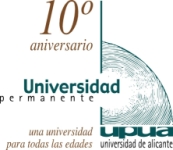The Permanent University of the University of Alicante
The “Permanent University” programme started in the 1999-2000 academic year with 200 students and this (academic) year it celebrates its 10th anniversary. Facing the 2009-2010 academic year, we have 1,300 students pre-enrolled, who will take classes, carry out complementary activities and share personal experiences, in the classrooms of the Campus of the University of Alicante and in the University Venues, as well as outside of these in very diverse cultural surroundings.
Year after year, this academic project makes a great effort in order to provide answers to an important demand by the students, which does not stop increasing and which situates the UPUA as one of the highest references at the Lucentum Campus concerning the volume of academic services. Likewise, it demonstrates that the Permanent University is already deeply integrated in the society of Alicante. However, nothing of this would have been possible without the implication and the enthusiastic collaboration of the diverse organizations and institutions which constitute the key support for the academic and cultural programme and which are, after all, the ones responsible for the fact that a project like this, of such a great socioeducational relevance, can be reality. To the determined support - which is given by the rectorship of the University of Alicante and its Social Council, so that the UPUA can remain and consolidate within the frame of educational structures of the University of Alicante - we can add the help of organizations like the LOCAL CULTURAL BOARD of the city council of Alicante, which together with the support of the Educational Council of the Valencian Parliament and the BANCAJA FOUNDATION, carry on guarantying the viability of this programme.
There are four basic pillars of the programme:
- The academic programme and the “sensu estricto” education, directed towards the carrying out of the Diploma Senior within the model frame of University Programmes for Elderly Persons in Spain. This is a completely optional programme, free in its programme outline to which you gain access without requirements, nor previous qualifications, having as its only condition being over 50 years old.
- The Programme of Extracurricular Activities, shared with the Secretariats of Culture, Extracurricular Activities and Sports, the Alicante Town University Venue and the Museum of the University of Alicante (MUA), and aimed at the popularisation of Science and Culture, for that we receive periodically a support by public (city councils and University Venues of the province) and private institutions (BANCAJA Foundation, La Cam charitable work, La Caixa Foundation, OAMI, Official Pharmaceutics’ College Allicante, MAPFRE foundation).
- The national and international research and cooperation for carrying out projects concerning permanent education and lifelong learning within the European Higher Education Area. In this sense, the UPUA develops and shares cooperation lines by means of projects, courses, workshops, conferences, meetings and congresses related to the improvement of educational University programmes for elderly persons, in aspects of educational management, quality and academic regulation, both in Spain and in other countries of our surrounding.
- The active participation of the elderly students, which allowed starting some important initiatives and projects about research and collaborative and voluntarily organized learning, as well as national and international exchange and mobility programmes. This promotes to a great extent the development of cultural and personal autonomy and the capacity of social interaction; all these aspects provide the programme with a higher quality.
Always keeping in mind the achievement of all these objectives, we start from an innovative teaching/learning model:
- Active: the teaching/learning is done by practice and application of the acquired knowledge.
- Participatory: the emphasis is put on the participation of the elderly students within the programme and the carrying out of curricular suggestions
- Socializing: it is based on group work and social interaction between students and teachers
- Open and Flexible: it adapts to the educational necessities, to the available spaces and to the age of the target group
- Intergenerational: it tries to find a connection between different age and population groups through common actions
The majority of our students are women (63% as opposed to 37% men) with ages ranging between 50 and 93 years. In the 2008-09 academic year, students enrolled in 134 subjects, corresponding to the following areas: Humanities (47%), Computer Science, Image and Sound (27%), Experimental Sciences (8%), Health and Social Action (11%) and, finally Society and Law (7%). From the beginning of the Permanent University project on, approximately 350 students have obtained already the Diploma Senior, by which the studies are recognized for strictly academic purposes. This diploma is given to those students, who have passed 72 credit points, that is 3 academic years minimum, with 6 subjects of our UPUA programme. The oldest of these graduates is 93 years old.
It has to be pointed out that this is a Lifelong Learning Programme, which is focused mainly on personal development and on promoting an active citizenship that is able to maintain a high level of autonomy within the knowledge society of the 21st century. Among the maxims, which serve as an inspiration for the programme, the one defining best our students’ aspirations is “learning for the pleasure of learning” and sharing experiences and knowledge, in a University, which we would like to be open to all the ages and the citizenship as a whole.
During this 2009-2010 academic year, in which we celebrate the 10th anniversary of the programme, we will carry out a high amount of activities with the purpose to make known our educational and cultural objectives and open us even more, if possible, to society with the focus on achieving “a society and a university open to all the ages, where a real dialogue between generations can take place” through experiences and good practices that will be carried out at the University of Alicante.
![]()

